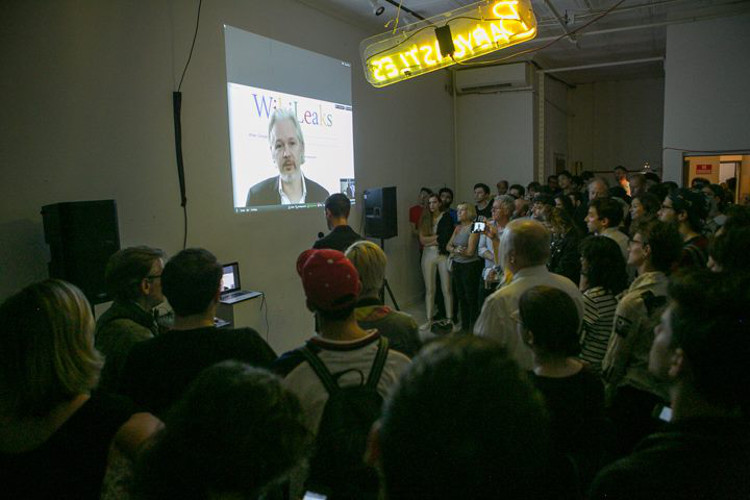WikiLeaks founder Julian Assange spoke with journalists and supporters via Skype Wednesday at a book launch event in Manhattan for his latest When Google Met Wikileaks, an edited transcript of a June 2011 encounter with Google Chairman Eric Schmidt.
Appearing from the Ecuadorian Embassy in London, where he’s been holed up since seeking diplomatic asylum there on June 19, 2012, the thinly bearded 43-year-old spoke for roughly an hour and a half about his book, the man at the top of the world’s most popular search engine, and its revolving door with the U.S. government. He talked about Bitcoin—the online-based currency—the Obama administration’s ongoing war against whistleblowers and Chelsea Manning, the former U.S. Army private who supplied WikiLeaks with more than 750,000 diplomatic cables and Army reports regarding the wars in Iraq and Afghanistan, along with two cockpit videos documenting U.S. air strikes massacring civilians in those conflicts.
Assange repeatedly warned of the dangers posed by the mass surveillance of tech giants Google and Facebook, assailing Schmidt and the omnipresent search engine he oversees as worse than the National Security Agency (NSA) in terms of privacy concerns and the sheer, unregulated power it wields via the mass personal data voluntarily handed over by users.
Perhaps one of the most wanted men in the world—there has been a longstanding European Union-wide warrant requested by Sweden in effect for his extradition to that country to face questioning for allegations he raped one woman and molested another during a 2010 visit to Stockholm, thus, his exile at the embassy—Assange also shed light on the whereabouts of perhaps one of the United States’ most sensitive wartime footage to date: the Granai Airstrike Video, documenting the killing of up to 150 Afghan civilians, purportedly mostly children, by a US Air Force bomber in Farah Province in May 2009.
Projected on the second-floor wall of art space/collective/indie arcade Babycastles at 137 W. 14th Street via Skype and superimposed before the cover art of When Google Met WikiLeaks—the book’s title entered within the search box on Google’s homepage with the added option “I’m feeling evil” as opposed to it’s typical “I’m feeling lucky”—he sat alongside singer/rapper Mathangi “Maya” Arulpragasam aka M.I.A., though she only popped into the broadcast briefly.
Daniel Stuckey of Motherboard moderated.
Assange, the hacker-turned-publisher of the world’s governments’ most damning secrets-turned-captive began the evening by reciting lyrics from M.I.A.’s song “The Message,” which he also quoted in his book:
“Headbone connected to the headphones / Headphones connected to the iPhone / iPhone connected to the Internet / Connected to the Google/ Connected to the government,” he read, quoting a passage from his book.
Essentially, he explained throughout the course of the launch—first during a discussion and then a brief Q&A with the public and media outlets—there is no difference or separation between Google or the United States government. Rather, they are, in fact, one in the same.
“Google has become an invasive organization that wants to have a business model of formulating every single person it can on the Earth, collecting their private information, storing it, indexing it, and producing profiles of individuals so they can sell those profiles to better target ads on them and also sell its other services to the National Security Agency, and the US military, and enter into strategic relationships with the US state department,” he told reporters from The Wall Street Journal, New York Daily News, New York Post (who sent several, organizers told the Press, among them its Page Six photographer, who snapped away as we all drank $5 bottles of warm beer and cups of wine, conversing among arcade games, paintings and stacks of other titles published by OR Books, the publisher of When Google Met WikiLeaks and Assange’s Cypherpunks: Freedom and the Future of the Internet). Co-publisher Colin Robinson announced to everyone there’d be a 20-percent discount for any Google employees in attendance.
“What is happening to Google is the most important thing that is happening to the Internet,” continued Assange. “And what happens to the Internet happens to all of us, because society, not just American society, but the global society, has merged with the Internet. The Internet has become the backbone of international civilization…. That is a new form of colonialism. It is digital colonialism. Breeding the values of high-tech American exceptionalism to the rest of the world. And that is then also being reflected domestically within the United States.
“Now no one thought of Google this way,” he added. “I didn’t think of Google this way, initially. I had this very interesting and unusual meeting…in 2011 with Eric Schmidt and three other people, a secret meeting, which ended up turning into Google’s book for its vision for the future of the world, The New Digital Age [co-authored by Schmidt and former U.S. Secretary of State Planning Staff member/advisor to Condoleeza Rice and Hillary Clinton-turned-Google Ideas director Jared Cohen]. And this book [When Google Met WikiLeaks] is largely a reply to that vision. No one else it seems took that vision seriously. And that’s something that’s quite interesting.”
Assange attributed Google’s successful invasion and pillaging of the global public’s most personal data to that of a cyber-Trojan Horse whose PR, marketing and packaging cloaks its sinisterism, enabling it to infiltrate more covertly than even the largest defense contractors and spy agencies, with users being none the wiser—even with that stated mission being published in black and white, available and accessible for anyone to read, from the shelves of local bookstores.
“If Chevron or Lockheed Martin had written down what its vision for the future of the world is, and how it’s going to bring it about and how it was shaping up and the nature of its, some of the nature of its relationships, a book that has on the back of it pre-publication endorsements by Henry Kissinger, Madeline Albright, Tony Blair and the former head of the National Security Agency and CIA [General Michael] Hayden, we would be quite concerned and there would be political scholars, like Noam Chomsky, trying to understand what that meant,” explained Assange.
“But because Google has successfully—up until about a year ago—successfully positioned itself as a playful thing, their colored logo presenting itself under the eyeballs of people around the world more than a billion times a day, a playful thing, like it is a playroom, with soft, curved [thoughts] and soft toys, a place where we can go to look at things, a place that provides information for free, we have come to think of it as something that is helpful, or an assistant, a tap, a magical angel that disgorges helpful and useful information and not an organization like every other organization,” he continued. “Not an organization which spends now more money lobbying with Washington, DC than Lockheed Martin. Not an organization which has engaged in contracts with the National Security Agency since 2003…. And not an organization with a revolving door between the US State Department and Google and between the White House and Google.”

Assange said Google’s Android mobile operating system gains 1.5 million new user subscriptions each day, consistently providing Google with their location “whether they know that they’re doing it or not, location, their contacts, their emails.”
“That’s the basic business model: to look like you’re a soft, playful organization, to collect the world’s information or index it and then of course, the National Security Agency and other actors with the United States feed off what Google is doing,” he stated, matter-of-factly. “Ultimately, even if Google reacts and tries to distance itself, as it has done a little bit in response to being called out by Edward Snowden revelations, ultimately it is…susceptible to coercive power in the United States.”
“Its audience isn’t designed to be common readers, its audience is designed to be Washington,” the WikiLeaks founder said of Schmidt’s New Digital Age, foretelling of an even grimmer, even more Orwellian future if all continues the way it’s been. “What Lockheed Martin was to the 20th century, high-tech companies will be to the 21st century.”
If Assange’s dire description is correct—and his new book boasts voluminous citations directing readers to scores of documents purporting to prove it is—then why isn’t this incestuous Big Brother love fest on the cover of every major newspaper across the globe, you might ask?
Banal tech-gadget reporters are the only ones reporting on Schmidt and Cohen’s view of the future, he explained, “because there’s this absurd blind aspect to humanities in most universities and it seems [among] political commentators where they just don’t get Google, they don’t get the Internet…. Once upon a time we didn’t get nuclear weapons, either.”
Over time, the public came to understand that those weapons “shape geopolitics, shape societies, shape the balance of power,” he explained. “And what Google has become and what the Internet has become is just as important, perhaps even more important in a sense that it’s penetrating every single society at once.”
Just as Assange has taken to the airwaves (and art gallery walls) recently to promote the message within When Google Met WikiLeaks, so too has Schmidt to debunk both it and its author. The Google executive chairman is also stumping for his own latest book, How Google Works, released the day before Assange’s launch party at Babycastles.
“Well, he’s, of course, writing from the, shall we say, luxury lodgings of the local embassy in London,” Schmidt told ABC News of Assange on Sept. 23. “The fact of the matter is Julian is very paranoid about things and it’s true that the NSA did things that they shouldn’t have done, but Google has done none of those things. Google never collaborated with NSA and in fact, we’ve fought very hard against what they did and since what the NSA did which we do not like, we have taken all of our data, all of our exchanges, and we fully encrypted them so no one can get them, especially the government.”
“He has a difficult job,” Assange responded to Schmidt’s jab on Wednesday when prompted by Stuckey. “Read the book, you’ll come to understand that Eric Schmidt’s job is to be Secretary of State to Google, essentially. To be the external relations [arm] for Google to meet presidents, including the United States, and to deal with all those people.
“It’s sad that he has to resort to name calling,” he continued, adding that it was he who introduced Schmidt to Bitcoin, telling the Google billionaire back then that it was a good time to buy in.
“Thank goodness he didn’t take that advice because his $8 billion now would be worth 8,000 times more than that,” Assange laughed on Wednesday.
“He who controls the present controls the past, and he who controls the past controls the future,” warned Assange, quoting George Orwell, explaining, thus, whoever controls the present and historical archives and publications—then the past and the future doesn’t actually exist, just the present. “If you control the present, you can change what the records are… Then you control the future.”
Assange said Schmidt’s The New Digital Age proposes “that whistleblower sites should be regulated by the government, there should be a single government body run by the state where prospective publications from those whistleblower publications go to that body—it is an absurd centralization that we see from Russia, that the press should have pre-publication submissions to some body [of government].”

He stated the ambition of Google CEO and co-founder Larry Page as to make Google “as big as possible, to suck everything into it, every aspect of people’s lives… You go to sleep and Google alarm wakes you up, you’re connected to Google Calendar and creating your own sleep-cycle states.”
By harvesting and processing this data, Google knows their REM cycle states, and Google Watch knows when you go to your next appointment and whenever you wear Google Glass, he continued, equating cell phones, such as Google’s Android-operated smartphones, to “a tracking device that also makes calls.”
To the common argument made in support of increased surveillance or by those who state they can tolerate it and have no qualms because they themselves have nothing to hide, Assange fired back:
“When people say: ‘Why do I have to be concerned about this? I have done nothing wrong?’ Stop being so damn selfish, you’re not an island. Every time you go to a party and put on Facebook and take photographs of people at that party, you’re being a rat, you’re being a rat to your community, you’re being an informant, you’re being a narc to your community.”
“It’s not just about you,” he insisted. “You are part of your community. If you’re community goes down the tubes then you’re going to go with it.”
In response to an inquiry posed by the Press on the whereabouts of the Granai Airtrike Video, also known as the Garani Massacre Video, and whether it would ever see the light of day—Assange had said in published reports WikiLeaks had the video and was readying its release prior to it being taken by WikiLeaks former spokesperson Daniel Domscheit Berg and possibly destroyed—he replied:
“The Garani airstrike video is said to be in the hands of someone in Germany, who won’t release it to the public. A very sad situation, the deaths of over 60 Afghan children or 100 Afghans in a single massacre of children in Afghanistan by the United States military, by a B-2 bomber. And it’s not been released. The United States government, interestingly, scheduled some of it for release, and then decided that no, actually, in hindsight, they don’t want that out there.”
“Is that another flag for the list of flags to be captured for WikiLeaks?” asked Motherboard’s Dan Stuckey.
“Yes,” said Assange. “Recaptured.”
When Google Met WikiLeaks’ co-publisher Colin Robinson told the Press afterward he hopes Assange will be present—in the flesh—for his next book launch gala and not between the walls of a room “half the size of this room.”
“I go to London quite often and I always go to see him,” he said. “I always enjoy talking to him because he’s resolutely optimistic about his own personal situation and he’s also—we talk about politics, the politics of the Internet and it’s always very interesting. But when I leave and I pass that special branch officer who’s sitting at the entrance of the embassy checking everyone going in and out I sort of think ‘He should not be forced to be living [the way he is].’
“He’s been in there for over two years now,” lamented Robinson. “Whatever you think about these cases in Sweden, he basically did some very brave things this guy and he changed the world in very positive ways. It seems to be fundamentally wrong that people like him and Chelsea Manning are denied their freedom and George Bush is living on his ranch in Texas doing whatever the fuck he likes.”





























